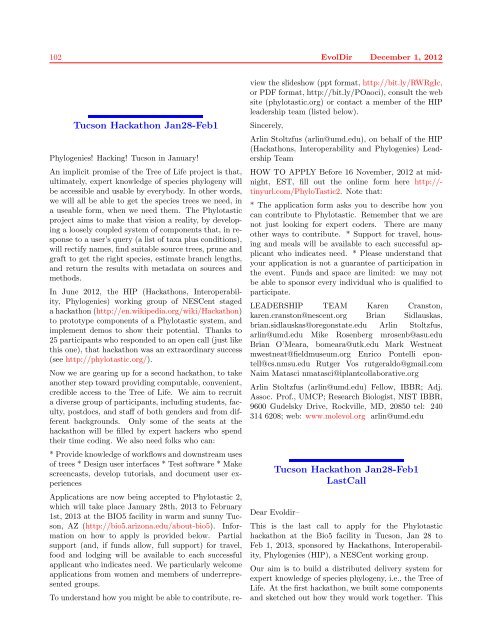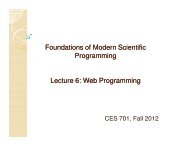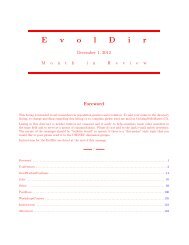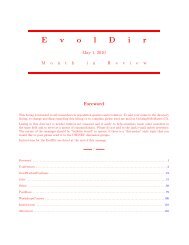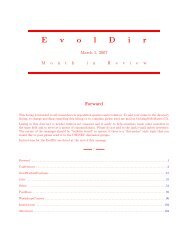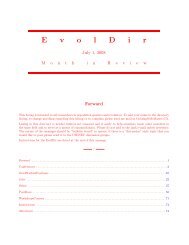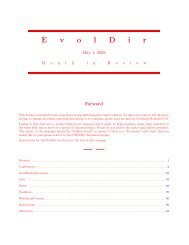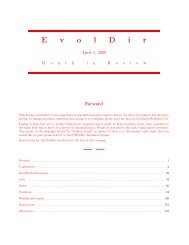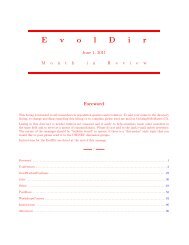E v o l D i r
E v o l D i r
E v o l D i r
Create successful ePaper yourself
Turn your PDF publications into a flip-book with our unique Google optimized e-Paper software.
102 EvolDir December 1, 2012<br />
Tucson Hackathon Jan28-Feb1<br />
Phylogenies! Hacking! Tucson in January!<br />
An implicit promise of the Tree of Life project is that,<br />
ultimately, expert knowledge of species phylogeny will<br />
be accessible and usable by everybody. In other words,<br />
we will all be able to get the species trees we need, in<br />
a useable form, when we need them. The Phylotastic<br />
project aims to make that vision a reality, by developing<br />
a loosely coupled system of components that, in response<br />
to a user’s query (a list of taxa plus conditions),<br />
will rectify names, find suitable source trees, prune and<br />
graft to get the right species, estimate branch lengths,<br />
and return the results with metadata on sources and<br />
methods.<br />
In June 2012, the HIP (Hackathons, Interoperability,<br />
Phylogenies) working group of NESCent staged<br />
a hackathon (http://en.wikipedia.org/wiki/Hackathon)<br />
to prototype components of a Phylotastic system, and<br />
implement demos to show their potential. Thanks to<br />
25 participants who responded to an open call (just like<br />
this one), that hackathon was an extraordinary success<br />
(see http://phylotastic.org/).<br />
Now we are gearing up for a second hackathon, to take<br />
another step toward providing computable, convenient,<br />
credible access to the Tree of Life. We aim to recruit<br />
a diverse group of participants, including students, faculty,<br />
postdocs, and staff of both genders and from different<br />
backgrounds. Only some of the seats at the<br />
hackathon will be filled by expert hackers who spend<br />
their time coding. We also need folks who can:<br />
* Provide knowledge of workflows and downstream uses<br />
of trees * Design user interfaces * Test software * Make<br />
screencasts, develop tutorials, and document user experiences<br />
Applications are now being accepted to Phylotastic 2,<br />
which will take place January 28th, 2013 to February<br />
1st, 2013 at the BIO5 facility in warm and sunny Tucson,<br />
AZ (http://bio5.arizona.edu/about-bio5). Information<br />
on how to apply is provided below. Partial<br />
support (and, if funds allow, full support) for travel,<br />
food and lodging will be available to each successful<br />
applicant who indicates need. We particularly welcome<br />
applications from women and members of underrepresented<br />
groups.<br />
To understand how you might be able to contribute, re-<br />
view the slideshow (ppt format, http://bit.ly/RWRgIc,<br />
or PDF format, http://bit.ly/POaoci), consult the web<br />
site (phylotastic.org) or contact a member of the HIP<br />
leadership team (listed below).<br />
Sincerely,<br />
Arlin Stoltzfus (arlin@umd.edu), on behalf of the HIP<br />
(Hackathons, Interoperability and Phylogenies) Leadership<br />
Team<br />
HOW TO APPLY Before 16 November, 2012 at midnight,<br />
EST, fill out the online form here http://tinyurl.com/PhyloTastic2.<br />
Note that:<br />
* The application form asks you to describe how you<br />
can contribute to Phylotastic. Remember that we are<br />
not just looking for expert coders. There are many<br />
other ways to contribute. * Support for travel, housing<br />
and meals will be available to each successful applicant<br />
who indicates need. * Please understand that<br />
your application is not a guarantee of participation in<br />
the event. Funds and space are limited: we may not<br />
be able to sponsor every individual who is qualified to<br />
participate.<br />
LEADERSHIP TEAM Karen Cranston,<br />
karen.cranston@nescent.org Brian Sidlauskas,<br />
brian.sidlauskas@oregonstate.edu Arlin Stoltzfus,<br />
arlin@umd.edu Mike Rosenberg mrosenb@asu.edu<br />
Brian O’Meara, bomeara@utk.edu Mark Westneat<br />
mwestneat@fieldmuseum.org Enrico Pontelli epontell@cs.nmsu.edu<br />
Rutger Vos rutgeraldo@gmail.com<br />
Naim Matasci nmatasci@iplantcollaborative.org<br />
Arlin Stoltzfus (arlin@umd.edu) Fellow, IBBR; Adj.<br />
Assoc. Prof., UMCP; Research Biologist, NIST IBBR,<br />
9600 Gudelsky Drive, Rockville, MD, 20850 tel: 240<br />
314 6208; web: www.molevol.org arlin@umd.edu<br />
Tucson Hackathon Jan28-Feb1<br />
LastCall<br />
Dear Evoldir–<br />
This is the last call to apply for the Phylotastic<br />
hackathon at the Bio5 facility in Tucson, Jan 28 to<br />
Feb 1, 2013, sponsored by Hackathons, Interoperability,<br />
Phylogenies (HIP), a NESCent working group.<br />
Our aim is to build a distributed delivery system for<br />
expert knowledge of species phylogeny, i.e., the Tree of<br />
Life. At the first hackathon, we built some components<br />
and sketched out how they would work together. This


